Annotated Bibliography: The Role of IT in the Banking Sector
VerifiedAdded on 2022/08/12
|9
|3490
|17
Annotated Bibliography
AI Summary
This annotated bibliography examines the impact of Information Technology (IT) on the banking sector through an analysis of several research papers. The studies explore various aspects, including the effects of IT on employee performance, productivity, and customer satisfaction, with specific examples from the Nigerian and Ghanaian banking industries. The research highlights the benefits of technological innovations such as electronic banking, AI, and computerization, as well as their impact on HR management, record-keeping, and overall bank performance. The bibliography also addresses the challenges of technology adoption, such as the need for employee training and the potential for job displacement due to computerization. The papers draw on a range of methodologies, including case studies, surveys, and data analysis, to provide a comprehensive overview of the evolving role of IT in the banking sector. Several papers emphasize the importance of integrating technological systems, using AI, and providing online services to enhance customer satisfaction and operational efficiency.
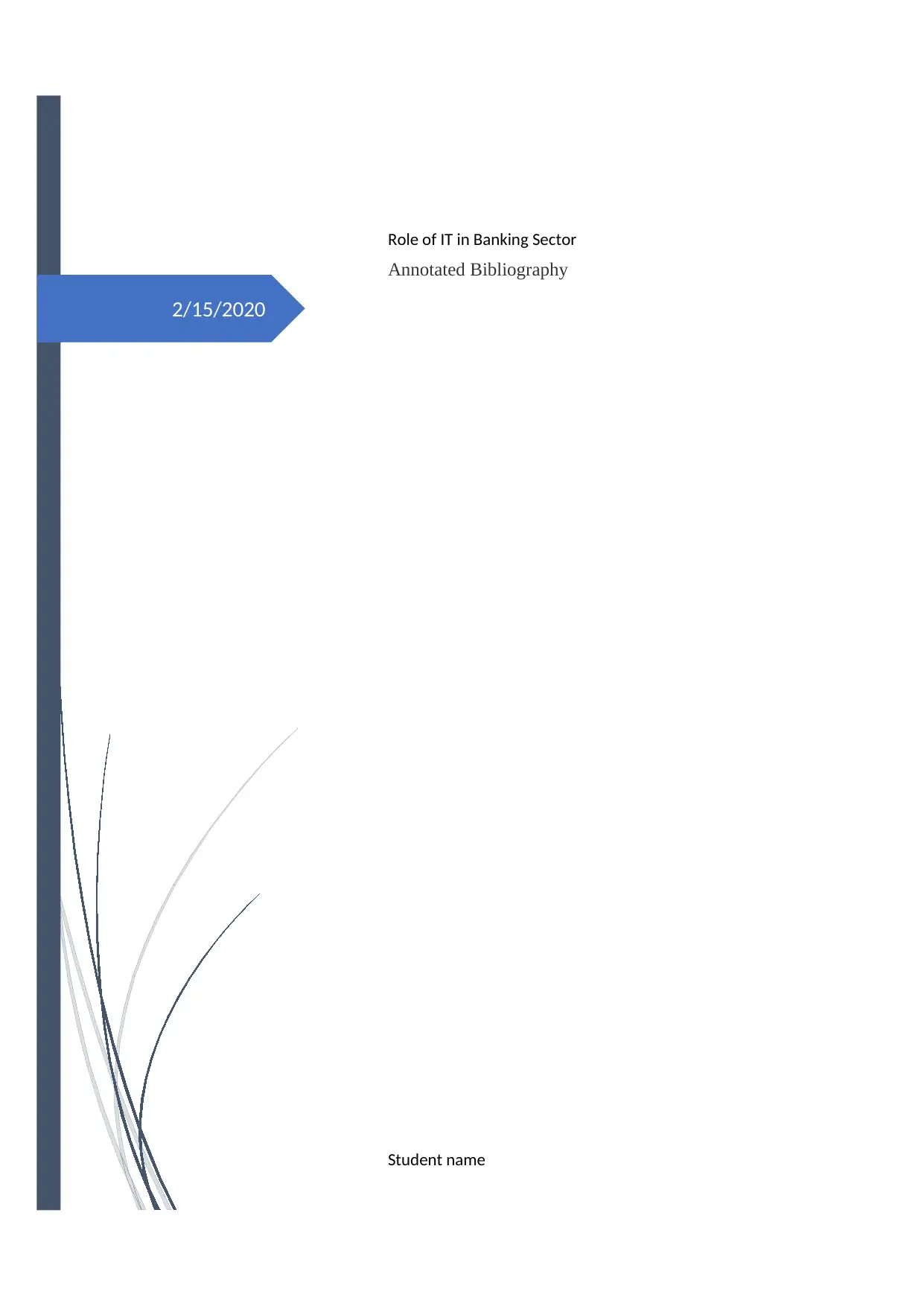
2/15/2020
Role of IT in Banking Sector
Annotated Bibliography
Student name
Role of IT in Banking Sector
Annotated Bibliography
Student name
Paraphrase This Document
Need a fresh take? Get an instant paraphrase of this document with our AI Paraphraser
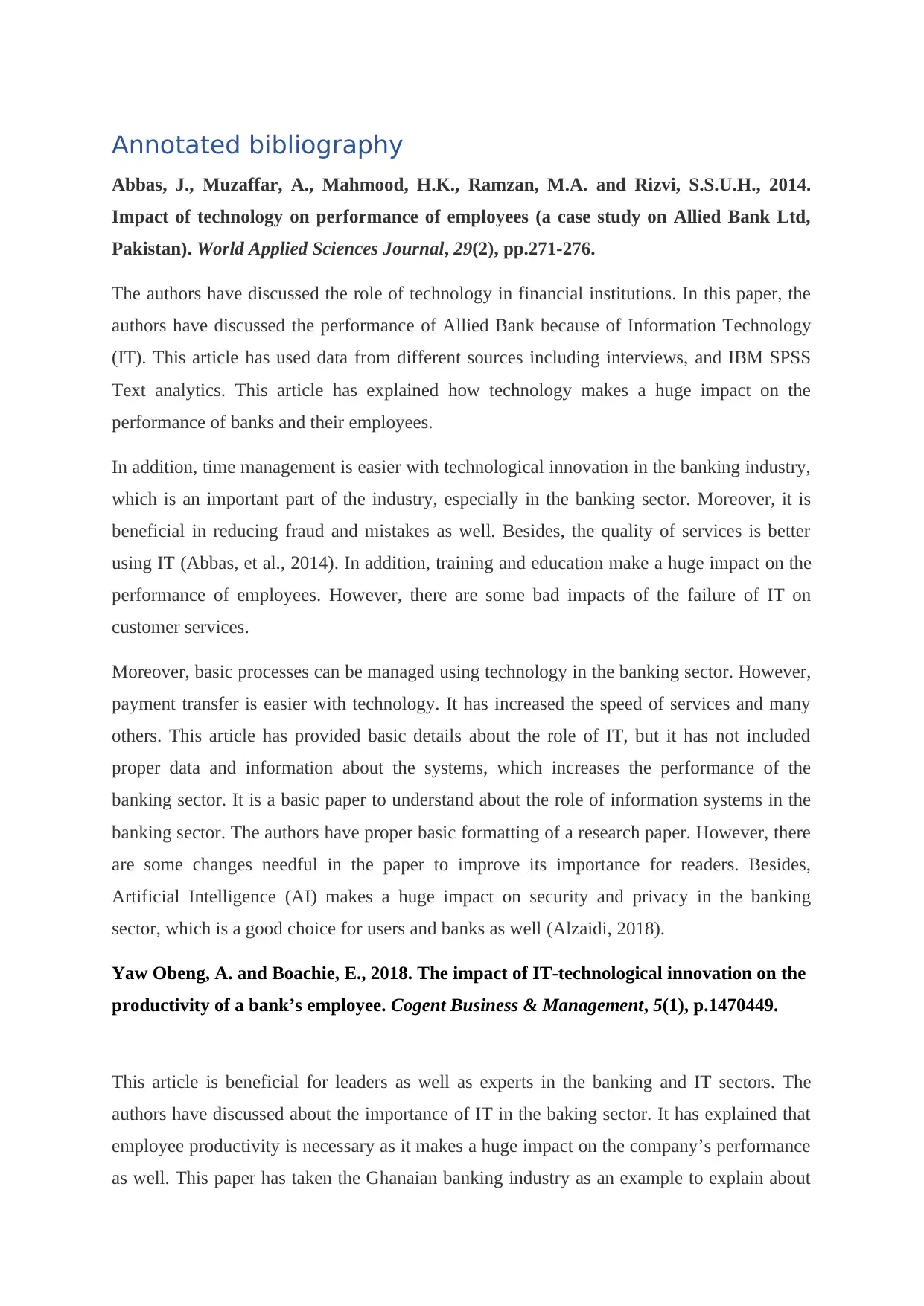
Annotated bibliography
Abbas, J., Muzaffar, A., Mahmood, H.K., Ramzan, M.A. and Rizvi, S.S.U.H., 2014.
Impact of technology on performance of employees (a case study on Allied Bank Ltd,
Pakistan). World Applied Sciences Journal, 29(2), pp.271-276.
The authors have discussed the role of technology in financial institutions. In this paper, the
authors have discussed the performance of Allied Bank because of Information Technology
(IT). This article has used data from different sources including interviews, and IBM SPSS
Text analytics. This article has explained how technology makes a huge impact on the
performance of banks and their employees.
In addition, time management is easier with technological innovation in the banking industry,
which is an important part of the industry, especially in the banking sector. Moreover, it is
beneficial in reducing fraud and mistakes as well. Besides, the quality of services is better
using IT (Abbas, et al., 2014). In addition, training and education make a huge impact on the
performance of employees. However, there are some bad impacts of the failure of IT on
customer services.
Moreover, basic processes can be managed using technology in the banking sector. However,
payment transfer is easier with technology. It has increased the speed of services and many
others. This article has provided basic details about the role of IT, but it has not included
proper data and information about the systems, which increases the performance of the
banking sector. It is a basic paper to understand about the role of information systems in the
banking sector. The authors have proper basic formatting of a research paper. However, there
are some changes needful in the paper to improve its importance for readers. Besides,
Artificial Intelligence (AI) makes a huge impact on security and privacy in the banking
sector, which is a good choice for users and banks as well (Alzaidi, 2018).
Yaw Obeng, A. and Boachie, E., 2018. The impact of IT-technological innovation on the
productivity of a bank’s employee. Cogent Business & Management, 5(1), p.1470449.
This article is beneficial for leaders as well as experts in the banking and IT sectors. The
authors have discussed about the importance of IT in the baking sector. It has explained that
employee productivity is necessary as it makes a huge impact on the company’s performance
as well. This paper has taken the Ghanaian banking industry as an example to explain about
Abbas, J., Muzaffar, A., Mahmood, H.K., Ramzan, M.A. and Rizvi, S.S.U.H., 2014.
Impact of technology on performance of employees (a case study on Allied Bank Ltd,
Pakistan). World Applied Sciences Journal, 29(2), pp.271-276.
The authors have discussed the role of technology in financial institutions. In this paper, the
authors have discussed the performance of Allied Bank because of Information Technology
(IT). This article has used data from different sources including interviews, and IBM SPSS
Text analytics. This article has explained how technology makes a huge impact on the
performance of banks and their employees.
In addition, time management is easier with technological innovation in the banking industry,
which is an important part of the industry, especially in the banking sector. Moreover, it is
beneficial in reducing fraud and mistakes as well. Besides, the quality of services is better
using IT (Abbas, et al., 2014). In addition, training and education make a huge impact on the
performance of employees. However, there are some bad impacts of the failure of IT on
customer services.
Moreover, basic processes can be managed using technology in the banking sector. However,
payment transfer is easier with technology. It has increased the speed of services and many
others. This article has provided basic details about the role of IT, but it has not included
proper data and information about the systems, which increases the performance of the
banking sector. It is a basic paper to understand about the role of information systems in the
banking sector. The authors have proper basic formatting of a research paper. However, there
are some changes needful in the paper to improve its importance for readers. Besides,
Artificial Intelligence (AI) makes a huge impact on security and privacy in the banking
sector, which is a good choice for users and banks as well (Alzaidi, 2018).
Yaw Obeng, A. and Boachie, E., 2018. The impact of IT-technological innovation on the
productivity of a bank’s employee. Cogent Business & Management, 5(1), p.1470449.
This article is beneficial for leaders as well as experts in the banking and IT sectors. The
authors have discussed about the importance of IT in the baking sector. It has explained that
employee productivity is necessary as it makes a huge impact on the company’s performance
as well. This paper has taken the Ghanaian banking industry as an example to explain about
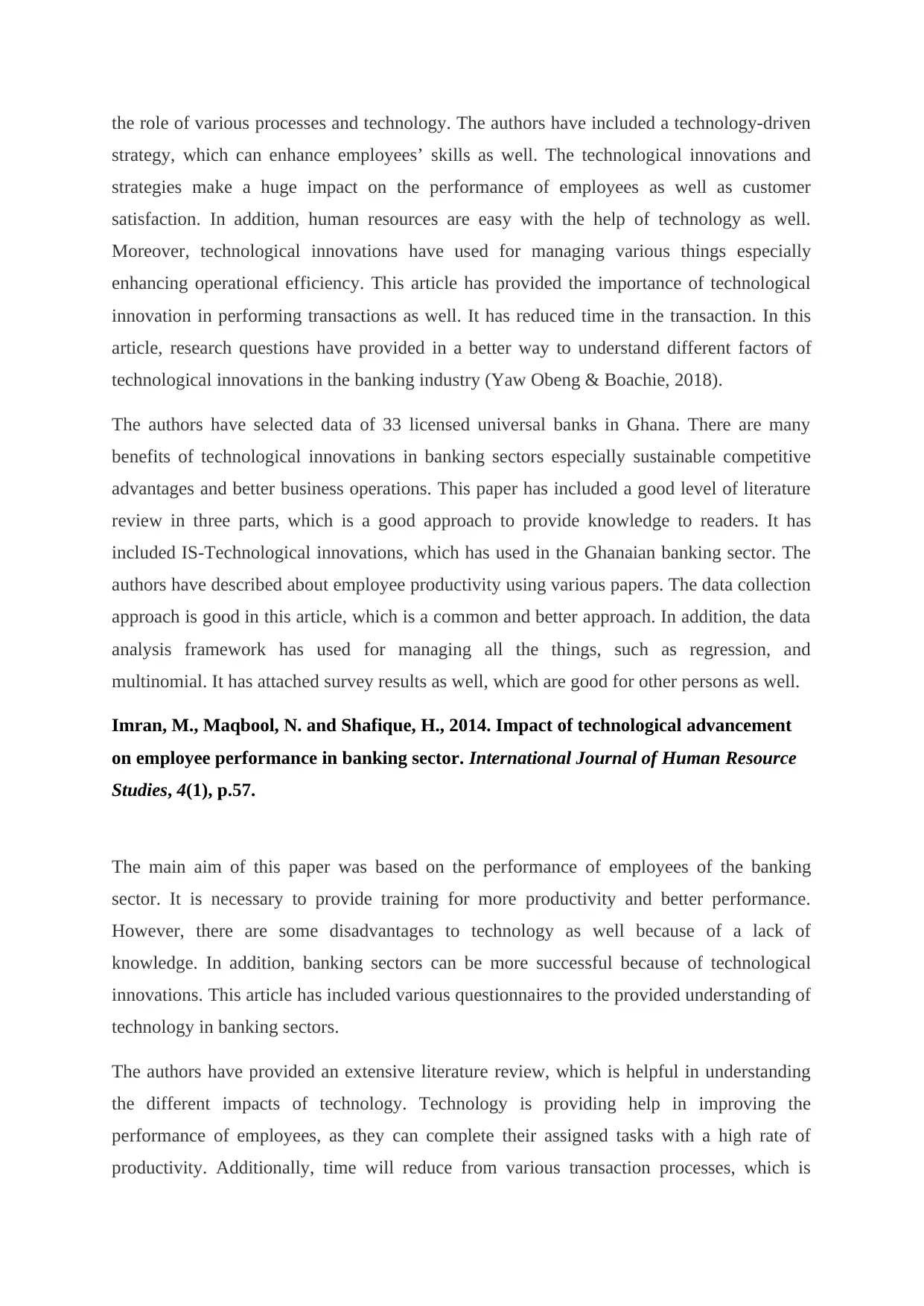
the role of various processes and technology. The authors have included a technology-driven
strategy, which can enhance employees’ skills as well. The technological innovations and
strategies make a huge impact on the performance of employees as well as customer
satisfaction. In addition, human resources are easy with the help of technology as well.
Moreover, technological innovations have used for managing various things especially
enhancing operational efficiency. This article has provided the importance of technological
innovation in performing transactions as well. It has reduced time in the transaction. In this
article, research questions have provided in a better way to understand different factors of
technological innovations in the banking industry (Yaw Obeng & Boachie, 2018).
The authors have selected data of 33 licensed universal banks in Ghana. There are many
benefits of technological innovations in banking sectors especially sustainable competitive
advantages and better business operations. This paper has included a good level of literature
review in three parts, which is a good approach to provide knowledge to readers. It has
included IS-Technological innovations, which has used in the Ghanaian banking sector. The
authors have described about employee productivity using various papers. The data collection
approach is good in this article, which is a common and better approach. In addition, the data
analysis framework has used for managing all the things, such as regression, and
multinomial. It has attached survey results as well, which are good for other persons as well.
Imran, M., Maqbool, N. and Shafique, H., 2014. Impact of technological advancement
on employee performance in banking sector. International Journal of Human Resource
Studies, 4(1), p.57.
The main aim of this paper was based on the performance of employees of the banking
sector. It is necessary to provide training for more productivity and better performance.
However, there are some disadvantages to technology as well because of a lack of
knowledge. In addition, banking sectors can be more successful because of technological
innovations. This article has included various questionnaires to the provided understanding of
technology in banking sectors.
The authors have provided an extensive literature review, which is helpful in understanding
the different impacts of technology. Technology is providing help in improving the
performance of employees, as they can complete their assigned tasks with a high rate of
productivity. Additionally, time will reduce from various transaction processes, which is
strategy, which can enhance employees’ skills as well. The technological innovations and
strategies make a huge impact on the performance of employees as well as customer
satisfaction. In addition, human resources are easy with the help of technology as well.
Moreover, technological innovations have used for managing various things especially
enhancing operational efficiency. This article has provided the importance of technological
innovation in performing transactions as well. It has reduced time in the transaction. In this
article, research questions have provided in a better way to understand different factors of
technological innovations in the banking industry (Yaw Obeng & Boachie, 2018).
The authors have selected data of 33 licensed universal banks in Ghana. There are many
benefits of technological innovations in banking sectors especially sustainable competitive
advantages and better business operations. This paper has included a good level of literature
review in three parts, which is a good approach to provide knowledge to readers. It has
included IS-Technological innovations, which has used in the Ghanaian banking sector. The
authors have described about employee productivity using various papers. The data collection
approach is good in this article, which is a common and better approach. In addition, the data
analysis framework has used for managing all the things, such as regression, and
multinomial. It has attached survey results as well, which are good for other persons as well.
Imran, M., Maqbool, N. and Shafique, H., 2014. Impact of technological advancement
on employee performance in banking sector. International Journal of Human Resource
Studies, 4(1), p.57.
The main aim of this paper was based on the performance of employees of the banking
sector. It is necessary to provide training for more productivity and better performance.
However, there are some disadvantages to technology as well because of a lack of
knowledge. In addition, banking sectors can be more successful because of technological
innovations. This article has included various questionnaires to the provided understanding of
technology in banking sectors.
The authors have provided an extensive literature review, which is helpful in understanding
the different impacts of technology. Technology is providing help in improving the
performance of employees, as they can complete their assigned tasks with a high rate of
productivity. Additionally, time will reduce from various transaction processes, which is
⊘ This is a preview!⊘
Do you want full access?
Subscribe today to unlock all pages.

Trusted by 1+ million students worldwide
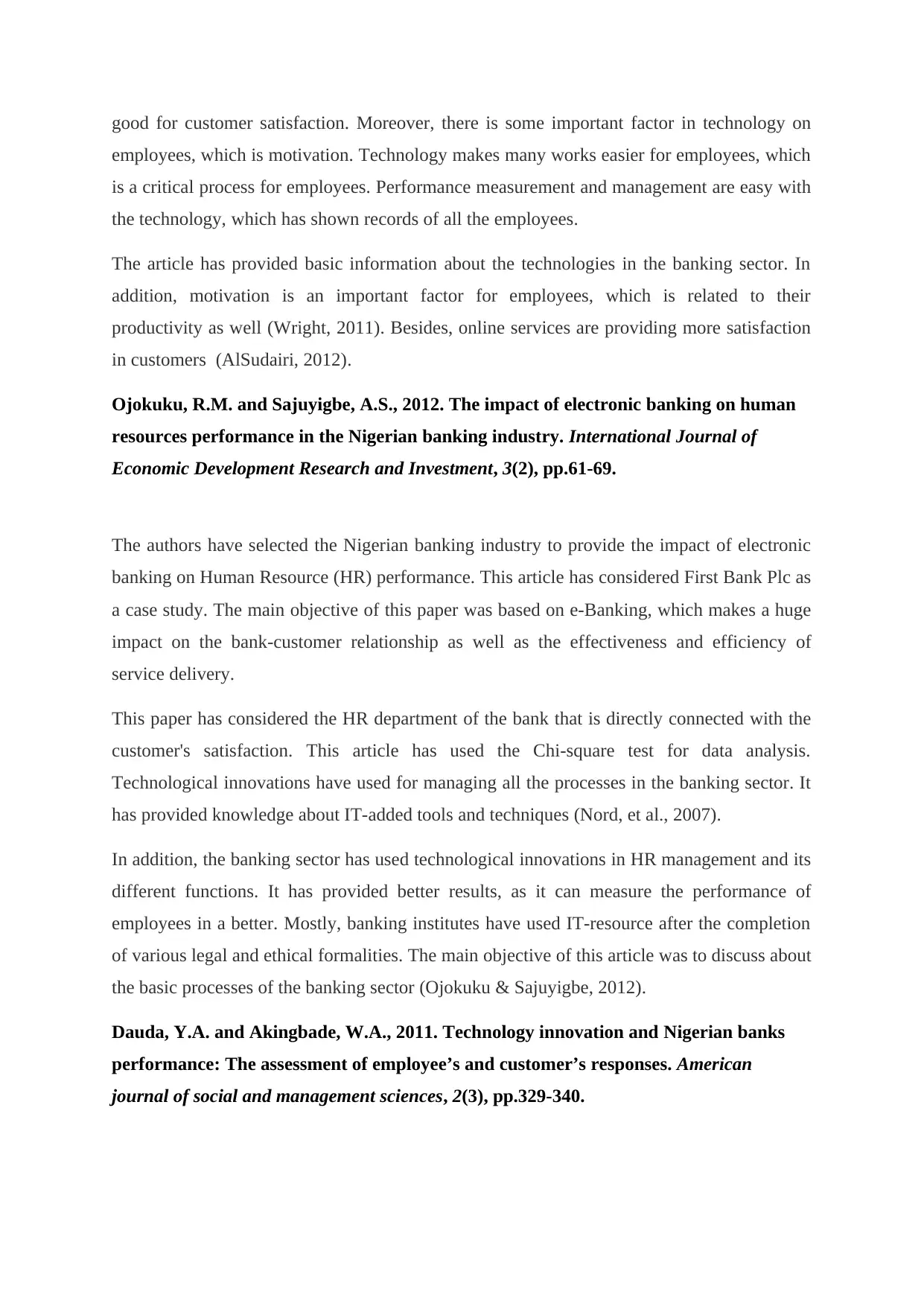
good for customer satisfaction. Moreover, there is some important factor in technology on
employees, which is motivation. Technology makes many works easier for employees, which
is a critical process for employees. Performance measurement and management are easy with
the technology, which has shown records of all the employees.
The article has provided basic information about the technologies in the banking sector. In
addition, motivation is an important factor for employees, which is related to their
productivity as well (Wright, 2011). Besides, online services are providing more satisfaction
in customers (AlSudairi, 2012).
Ojokuku, R.M. and Sajuyigbe, A.S., 2012. The impact of electronic banking on human
resources performance in the Nigerian banking industry. International Journal of
Economic Development Research and Investment, 3(2), pp.61-69.
The authors have selected the Nigerian banking industry to provide the impact of electronic
banking on Human Resource (HR) performance. This article has considered First Bank Plc as
a case study. The main objective of this paper was based on e-Banking, which makes a huge
impact on the bank-customer relationship as well as the effectiveness and efficiency of
service delivery.
This paper has considered the HR department of the bank that is directly connected with the
customer's satisfaction. This article has used the Chi-square test for data analysis.
Technological innovations have used for managing all the processes in the banking sector. It
has provided knowledge about IT-added tools and techniques (Nord, et al., 2007).
In addition, the banking sector has used technological innovations in HR management and its
different functions. It has provided better results, as it can measure the performance of
employees in a better. Mostly, banking institutes have used IT-resource after the completion
of various legal and ethical formalities. The main objective of this article was to discuss about
the basic processes of the banking sector (Ojokuku & Sajuyigbe, 2012).
Dauda, Y.A. and Akingbade, W.A., 2011. Technology innovation and Nigerian banks
performance: The assessment of employee’s and customer’s responses. American
journal of social and management sciences, 2(3), pp.329-340.
employees, which is motivation. Technology makes many works easier for employees, which
is a critical process for employees. Performance measurement and management are easy with
the technology, which has shown records of all the employees.
The article has provided basic information about the technologies in the banking sector. In
addition, motivation is an important factor for employees, which is related to their
productivity as well (Wright, 2011). Besides, online services are providing more satisfaction
in customers (AlSudairi, 2012).
Ojokuku, R.M. and Sajuyigbe, A.S., 2012. The impact of electronic banking on human
resources performance in the Nigerian banking industry. International Journal of
Economic Development Research and Investment, 3(2), pp.61-69.
The authors have selected the Nigerian banking industry to provide the impact of electronic
banking on Human Resource (HR) performance. This article has considered First Bank Plc as
a case study. The main objective of this paper was based on e-Banking, which makes a huge
impact on the bank-customer relationship as well as the effectiveness and efficiency of
service delivery.
This paper has considered the HR department of the bank that is directly connected with the
customer's satisfaction. This article has used the Chi-square test for data analysis.
Technological innovations have used for managing all the processes in the banking sector. It
has provided knowledge about IT-added tools and techniques (Nord, et al., 2007).
In addition, the banking sector has used technological innovations in HR management and its
different functions. It has provided better results, as it can measure the performance of
employees in a better. Mostly, banking institutes have used IT-resource after the completion
of various legal and ethical formalities. The main objective of this article was to discuss about
the basic processes of the banking sector (Ojokuku & Sajuyigbe, 2012).
Dauda, Y.A. and Akingbade, W.A., 2011. Technology innovation and Nigerian banks
performance: The assessment of employee’s and customer’s responses. American
journal of social and management sciences, 2(3), pp.329-340.
Paraphrase This Document
Need a fresh take? Get an instant paraphrase of this document with our AI Paraphraser
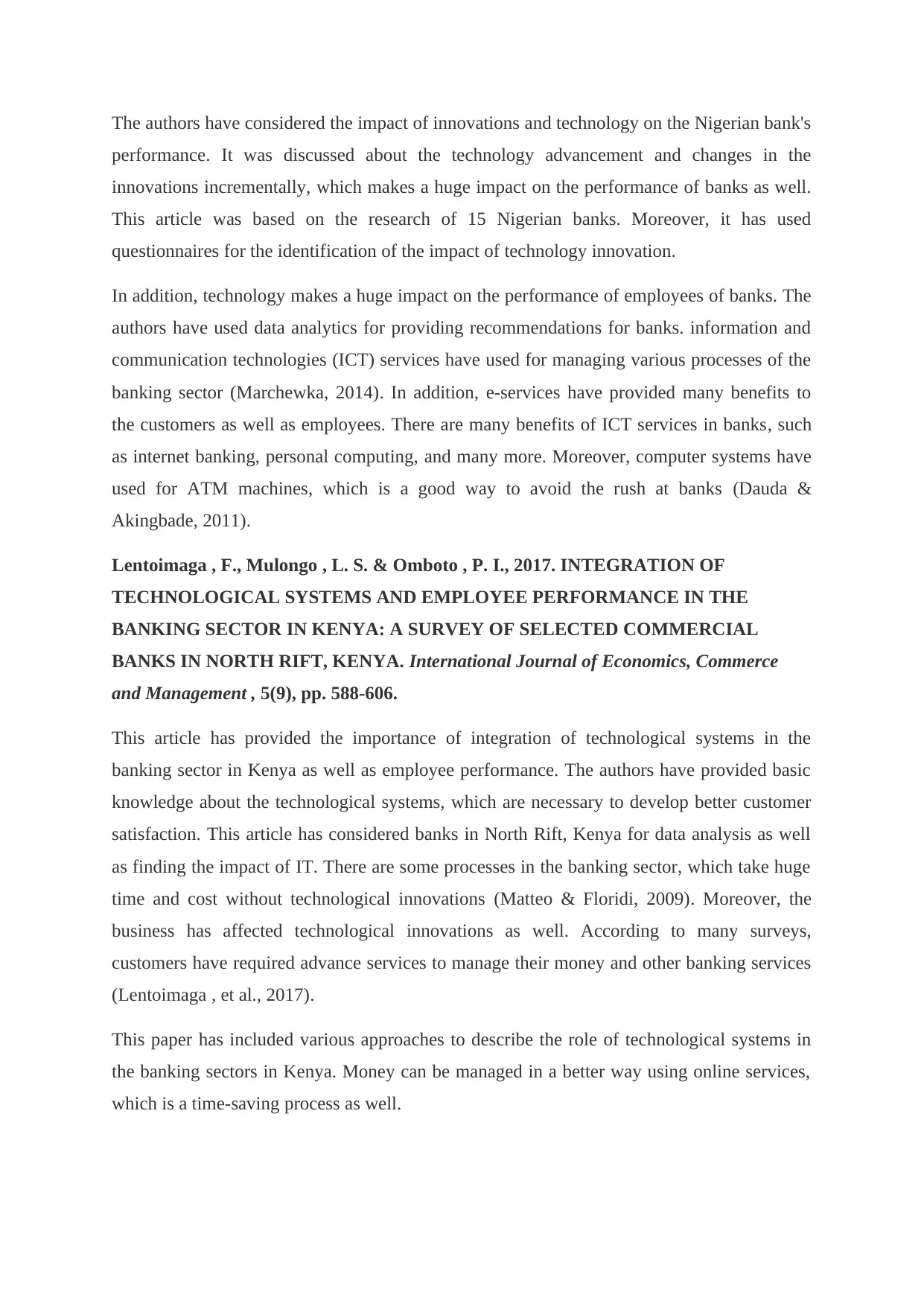
The authors have considered the impact of innovations and technology on the Nigerian bank's
performance. It was discussed about the technology advancement and changes in the
innovations incrementally, which makes a huge impact on the performance of banks as well.
This article was based on the research of 15 Nigerian banks. Moreover, it has used
questionnaires for the identification of the impact of technology innovation.
In addition, technology makes a huge impact on the performance of employees of banks. The
authors have used data analytics for providing recommendations for banks. information and
communication technologies (ICT) services have used for managing various processes of the
banking sector (Marchewka, 2014). In addition, e-services have provided many benefits to
the customers as well as employees. There are many benefits of ICT services in banks, such
as internet banking, personal computing, and many more. Moreover, computer systems have
used for ATM machines, which is a good way to avoid the rush at banks (Dauda &
Akingbade, 2011).
Lentoimaga , F., Mulongo , L. S. & Omboto , P. I., 2017. INTEGRATION OF
TECHNOLOGICAL SYSTEMS AND EMPLOYEE PERFORMANCE IN THE
BANKING SECTOR IN KENYA: A SURVEY OF SELECTED COMMERCIAL
BANKS IN NORTH RIFT, KENYA. International Journal of Economics, Commerce
and Management , 5(9), pp. 588-606.
This article has provided the importance of integration of technological systems in the
banking sector in Kenya as well as employee performance. The authors have provided basic
knowledge about the technological systems, which are necessary to develop better customer
satisfaction. This article has considered banks in North Rift, Kenya for data analysis as well
as finding the impact of IT. There are some processes in the banking sector, which take huge
time and cost without technological innovations (Matteo & Floridi, 2009). Moreover, the
business has affected technological innovations as well. According to many surveys,
customers have required advance services to manage their money and other banking services
(Lentoimaga , et al., 2017).
This paper has included various approaches to describe the role of technological systems in
the banking sectors in Kenya. Money can be managed in a better way using online services,
which is a time-saving process as well.
performance. It was discussed about the technology advancement and changes in the
innovations incrementally, which makes a huge impact on the performance of banks as well.
This article was based on the research of 15 Nigerian banks. Moreover, it has used
questionnaires for the identification of the impact of technology innovation.
In addition, technology makes a huge impact on the performance of employees of banks. The
authors have used data analytics for providing recommendations for banks. information and
communication technologies (ICT) services have used for managing various processes of the
banking sector (Marchewka, 2014). In addition, e-services have provided many benefits to
the customers as well as employees. There are many benefits of ICT services in banks, such
as internet banking, personal computing, and many more. Moreover, computer systems have
used for ATM machines, which is a good way to avoid the rush at banks (Dauda &
Akingbade, 2011).
Lentoimaga , F., Mulongo , L. S. & Omboto , P. I., 2017. INTEGRATION OF
TECHNOLOGICAL SYSTEMS AND EMPLOYEE PERFORMANCE IN THE
BANKING SECTOR IN KENYA: A SURVEY OF SELECTED COMMERCIAL
BANKS IN NORTH RIFT, KENYA. International Journal of Economics, Commerce
and Management , 5(9), pp. 588-606.
This article has provided the importance of integration of technological systems in the
banking sector in Kenya as well as employee performance. The authors have provided basic
knowledge about the technological systems, which are necessary to develop better customer
satisfaction. This article has considered banks in North Rift, Kenya for data analysis as well
as finding the impact of IT. There are some processes in the banking sector, which take huge
time and cost without technological innovations (Matteo & Floridi, 2009). Moreover, the
business has affected technological innovations as well. According to many surveys,
customers have required advance services to manage their money and other banking services
(Lentoimaga , et al., 2017).
This paper has included various approaches to describe the role of technological systems in
the banking sectors in Kenya. Money can be managed in a better way using online services,
which is a time-saving process as well.
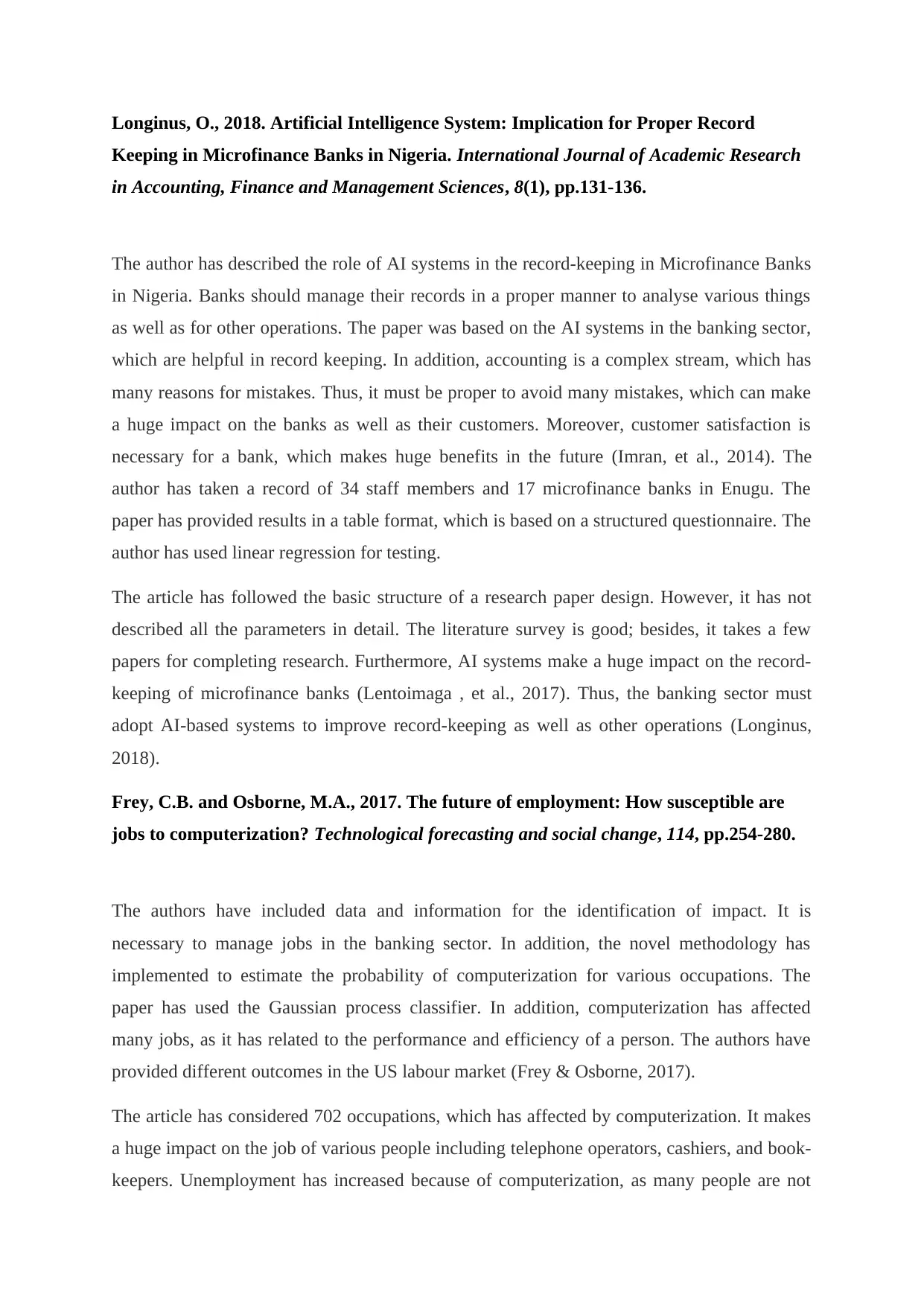
Longinus, O., 2018. Artificial Intelligence System: Implication for Proper Record
Keeping in Microfinance Banks in Nigeria. International Journal of Academic Research
in Accounting, Finance and Management Sciences, 8(1), pp.131-136.
The author has described the role of AI systems in the record-keeping in Microfinance Banks
in Nigeria. Banks should manage their records in a proper manner to analyse various things
as well as for other operations. The paper was based on the AI systems in the banking sector,
which are helpful in record keeping. In addition, accounting is a complex stream, which has
many reasons for mistakes. Thus, it must be proper to avoid many mistakes, which can make
a huge impact on the banks as well as their customers. Moreover, customer satisfaction is
necessary for a bank, which makes huge benefits in the future (Imran, et al., 2014). The
author has taken a record of 34 staff members and 17 microfinance banks in Enugu. The
paper has provided results in a table format, which is based on a structured questionnaire. The
author has used linear regression for testing.
The article has followed the basic structure of a research paper design. However, it has not
described all the parameters in detail. The literature survey is good; besides, it takes a few
papers for completing research. Furthermore, AI systems make a huge impact on the record-
keeping of microfinance banks (Lentoimaga , et al., 2017). Thus, the banking sector must
adopt AI-based systems to improve record-keeping as well as other operations (Longinus,
2018).
Frey, C.B. and Osborne, M.A., 2017. The future of employment: How susceptible are
jobs to computerization? Technological forecasting and social change, 114, pp.254-280.
The authors have included data and information for the identification of impact. It is
necessary to manage jobs in the banking sector. In addition, the novel methodology has
implemented to estimate the probability of computerization for various occupations. The
paper has used the Gaussian process classifier. In addition, computerization has affected
many jobs, as it has related to the performance and efficiency of a person. The authors have
provided different outcomes in the US labour market (Frey & Osborne, 2017).
The article has considered 702 occupations, which has affected by computerization. It makes
a huge impact on the job of various people including telephone operators, cashiers, and book-
keepers. Unemployment has increased because of computerization, as many people are not
Keeping in Microfinance Banks in Nigeria. International Journal of Academic Research
in Accounting, Finance and Management Sciences, 8(1), pp.131-136.
The author has described the role of AI systems in the record-keeping in Microfinance Banks
in Nigeria. Banks should manage their records in a proper manner to analyse various things
as well as for other operations. The paper was based on the AI systems in the banking sector,
which are helpful in record keeping. In addition, accounting is a complex stream, which has
many reasons for mistakes. Thus, it must be proper to avoid many mistakes, which can make
a huge impact on the banks as well as their customers. Moreover, customer satisfaction is
necessary for a bank, which makes huge benefits in the future (Imran, et al., 2014). The
author has taken a record of 34 staff members and 17 microfinance banks in Enugu. The
paper has provided results in a table format, which is based on a structured questionnaire. The
author has used linear regression for testing.
The article has followed the basic structure of a research paper design. However, it has not
described all the parameters in detail. The literature survey is good; besides, it takes a few
papers for completing research. Furthermore, AI systems make a huge impact on the record-
keeping of microfinance banks (Lentoimaga , et al., 2017). Thus, the banking sector must
adopt AI-based systems to improve record-keeping as well as other operations (Longinus,
2018).
Frey, C.B. and Osborne, M.A., 2017. The future of employment: How susceptible are
jobs to computerization? Technological forecasting and social change, 114, pp.254-280.
The authors have included data and information for the identification of impact. It is
necessary to manage jobs in the banking sector. In addition, the novel methodology has
implemented to estimate the probability of computerization for various occupations. The
paper has used the Gaussian process classifier. In addition, computerization has affected
many jobs, as it has related to the performance and efficiency of a person. The authors have
provided different outcomes in the US labour market (Frey & Osborne, 2017).
The article has considered 702 occupations, which has affected by computerization. It makes
a huge impact on the job of various people including telephone operators, cashiers, and book-
keepers. Unemployment has increased because of computerization, as many people are not
⊘ This is a preview!⊘
Do you want full access?
Subscribe today to unlock all pages.

Trusted by 1+ million students worldwide
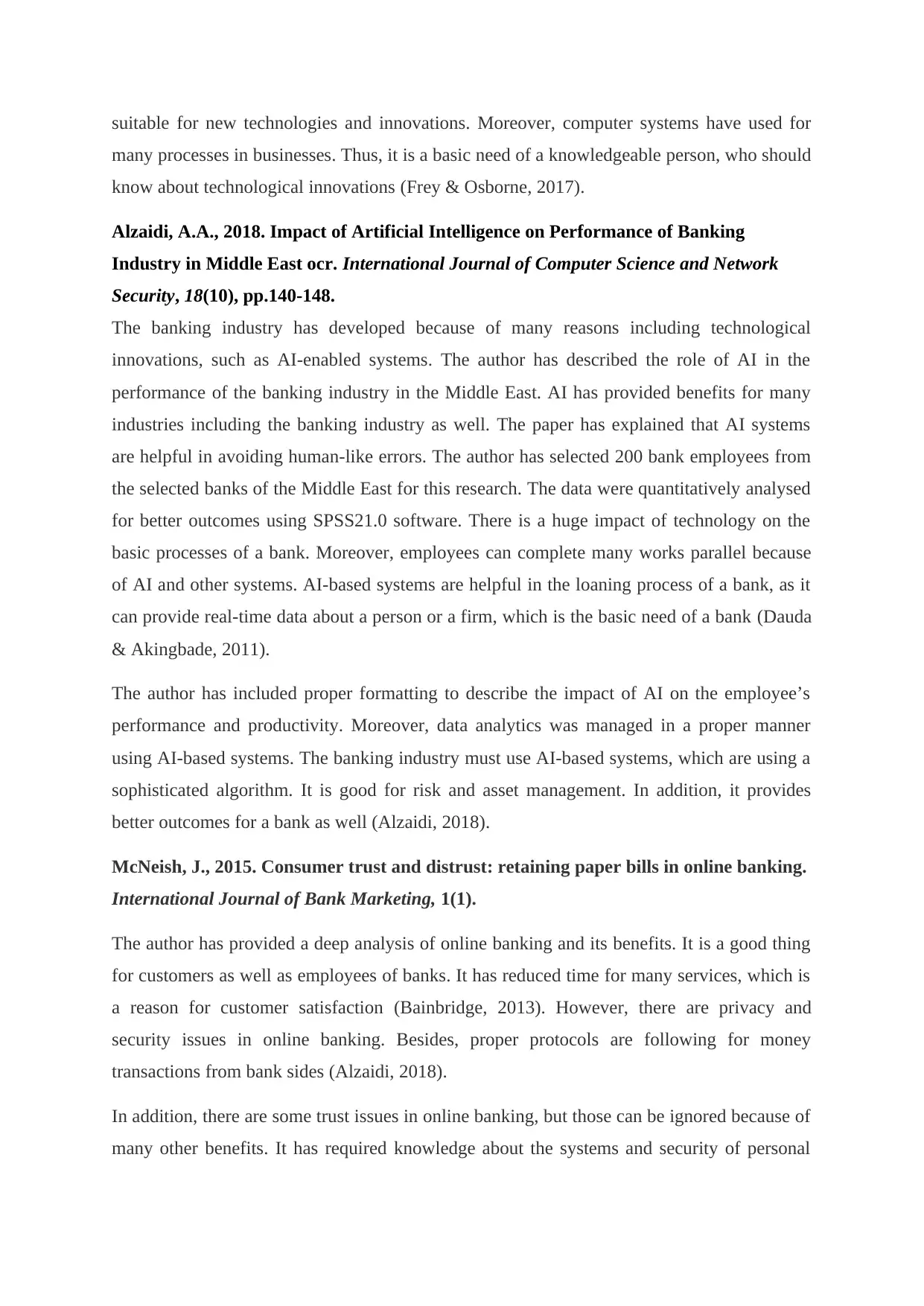
suitable for new technologies and innovations. Moreover, computer systems have used for
many processes in businesses. Thus, it is a basic need of a knowledgeable person, who should
know about technological innovations (Frey & Osborne, 2017).
Alzaidi, A.A., 2018. Impact of Artificial Intelligence on Performance of Banking
Industry in Middle East ocr. International Journal of Computer Science and Network
Security, 18(10), pp.140-148.
The banking industry has developed because of many reasons including technological
innovations, such as AI-enabled systems. The author has described the role of AI in the
performance of the banking industry in the Middle East. AI has provided benefits for many
industries including the banking industry as well. The paper has explained that AI systems
are helpful in avoiding human-like errors. The author has selected 200 bank employees from
the selected banks of the Middle East for this research. The data were quantitatively analysed
for better outcomes using SPSS21.0 software. There is a huge impact of technology on the
basic processes of a bank. Moreover, employees can complete many works parallel because
of AI and other systems. AI-based systems are helpful in the loaning process of a bank, as it
can provide real-time data about a person or a firm, which is the basic need of a bank (Dauda
& Akingbade, 2011).
The author has included proper formatting to describe the impact of AI on the employee’s
performance and productivity. Moreover, data analytics was managed in a proper manner
using AI-based systems. The banking industry must use AI-based systems, which are using a
sophisticated algorithm. It is good for risk and asset management. In addition, it provides
better outcomes for a bank as well (Alzaidi, 2018).
McNeish, J., 2015. Consumer trust and distrust: retaining paper bills in online banking.
International Journal of Bank Marketing, 1(1).
The author has provided a deep analysis of online banking and its benefits. It is a good thing
for customers as well as employees of banks. It has reduced time for many services, which is
a reason for customer satisfaction (Bainbridge, 2013). However, there are privacy and
security issues in online banking. Besides, proper protocols are following for money
transactions from bank sides (Alzaidi, 2018).
In addition, there are some trust issues in online banking, but those can be ignored because of
many other benefits. It has required knowledge about the systems and security of personal
many processes in businesses. Thus, it is a basic need of a knowledgeable person, who should
know about technological innovations (Frey & Osborne, 2017).
Alzaidi, A.A., 2018. Impact of Artificial Intelligence on Performance of Banking
Industry in Middle East ocr. International Journal of Computer Science and Network
Security, 18(10), pp.140-148.
The banking industry has developed because of many reasons including technological
innovations, such as AI-enabled systems. The author has described the role of AI in the
performance of the banking industry in the Middle East. AI has provided benefits for many
industries including the banking industry as well. The paper has explained that AI systems
are helpful in avoiding human-like errors. The author has selected 200 bank employees from
the selected banks of the Middle East for this research. The data were quantitatively analysed
for better outcomes using SPSS21.0 software. There is a huge impact of technology on the
basic processes of a bank. Moreover, employees can complete many works parallel because
of AI and other systems. AI-based systems are helpful in the loaning process of a bank, as it
can provide real-time data about a person or a firm, which is the basic need of a bank (Dauda
& Akingbade, 2011).
The author has included proper formatting to describe the impact of AI on the employee’s
performance and productivity. Moreover, data analytics was managed in a proper manner
using AI-based systems. The banking industry must use AI-based systems, which are using a
sophisticated algorithm. It is good for risk and asset management. In addition, it provides
better outcomes for a bank as well (Alzaidi, 2018).
McNeish, J., 2015. Consumer trust and distrust: retaining paper bills in online banking.
International Journal of Bank Marketing, 1(1).
The author has provided a deep analysis of online banking and its benefits. It is a good thing
for customers as well as employees of banks. It has reduced time for many services, which is
a reason for customer satisfaction (Bainbridge, 2013). However, there are privacy and
security issues in online banking. Besides, proper protocols are following for money
transactions from bank sides (Alzaidi, 2018).
In addition, there are some trust issues in online banking, but those can be ignored because of
many other benefits. It has required knowledge about the systems and security of personal
Paraphrase This Document
Need a fresh take? Get an instant paraphrase of this document with our AI Paraphraser
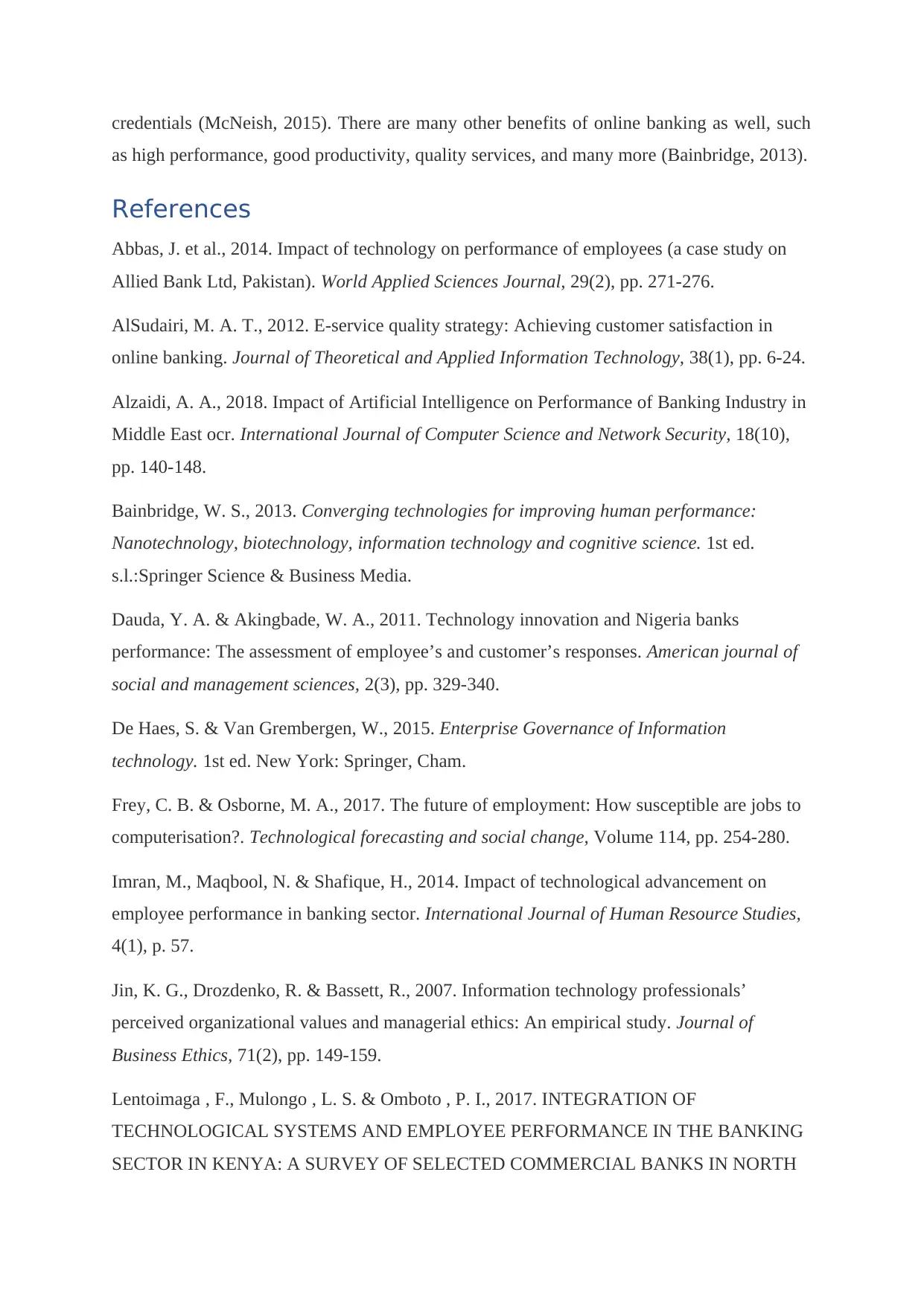
credentials (McNeish, 2015). There are many other benefits of online banking as well, such
as high performance, good productivity, quality services, and many more (Bainbridge, 2013).
References
Abbas, J. et al., 2014. Impact of technology on performance of employees (a case study on
Allied Bank Ltd, Pakistan). World Applied Sciences Journal, 29(2), pp. 271-276.
AlSudairi, M. A. T., 2012. E-service quality strategy: Achieving customer satisfaction in
online banking. Journal of Theoretical and Applied Information Technology, 38(1), pp. 6-24.
Alzaidi, A. A., 2018. Impact of Artificial Intelligence on Performance of Banking Industry in
Middle East ocr. International Journal of Computer Science and Network Security, 18(10),
pp. 140-148.
Bainbridge, W. S., 2013. Converging technologies for improving human performance:
Nanotechnology, biotechnology, information technology and cognitive science. 1st ed.
s.l.:Springer Science & Business Media.
Dauda, Y. A. & Akingbade, W. A., 2011. Technology innovation and Nigeria banks
performance: The assessment of employee’s and customer’s responses. American journal of
social and management sciences, 2(3), pp. 329-340.
De Haes, S. & Van Grembergen, W., 2015. Enterprise Governance of Information
technology. 1st ed. New York: Springer, Cham.
Frey, C. B. & Osborne, M. A., 2017. The future of employment: How susceptible are jobs to
computerisation?. Technological forecasting and social change, Volume 114, pp. 254-280.
Imran, M., Maqbool, N. & Shafique, H., 2014. Impact of technological advancement on
employee performance in banking sector. International Journal of Human Resource Studies,
4(1), p. 57.
Jin, K. G., Drozdenko, R. & Bassett, R., 2007. Information technology professionals’
perceived organizational values and managerial ethics: An empirical study. Journal of
Business Ethics, 71(2), pp. 149-159.
Lentoimaga , F., Mulongo , L. S. & Omboto , P. I., 2017. INTEGRATION OF
TECHNOLOGICAL SYSTEMS AND EMPLOYEE PERFORMANCE IN THE BANKING
SECTOR IN KENYA: A SURVEY OF SELECTED COMMERCIAL BANKS IN NORTH
as high performance, good productivity, quality services, and many more (Bainbridge, 2013).
References
Abbas, J. et al., 2014. Impact of technology on performance of employees (a case study on
Allied Bank Ltd, Pakistan). World Applied Sciences Journal, 29(2), pp. 271-276.
AlSudairi, M. A. T., 2012. E-service quality strategy: Achieving customer satisfaction in
online banking. Journal of Theoretical and Applied Information Technology, 38(1), pp. 6-24.
Alzaidi, A. A., 2018. Impact of Artificial Intelligence on Performance of Banking Industry in
Middle East ocr. International Journal of Computer Science and Network Security, 18(10),
pp. 140-148.
Bainbridge, W. S., 2013. Converging technologies for improving human performance:
Nanotechnology, biotechnology, information technology and cognitive science. 1st ed.
s.l.:Springer Science & Business Media.
Dauda, Y. A. & Akingbade, W. A., 2011. Technology innovation and Nigeria banks
performance: The assessment of employee’s and customer’s responses. American journal of
social and management sciences, 2(3), pp. 329-340.
De Haes, S. & Van Grembergen, W., 2015. Enterprise Governance of Information
technology. 1st ed. New York: Springer, Cham.
Frey, C. B. & Osborne, M. A., 2017. The future of employment: How susceptible are jobs to
computerisation?. Technological forecasting and social change, Volume 114, pp. 254-280.
Imran, M., Maqbool, N. & Shafique, H., 2014. Impact of technological advancement on
employee performance in banking sector. International Journal of Human Resource Studies,
4(1), p. 57.
Jin, K. G., Drozdenko, R. & Bassett, R., 2007. Information technology professionals’
perceived organizational values and managerial ethics: An empirical study. Journal of
Business Ethics, 71(2), pp. 149-159.
Lentoimaga , F., Mulongo , L. S. & Omboto , P. I., 2017. INTEGRATION OF
TECHNOLOGICAL SYSTEMS AND EMPLOYEE PERFORMANCE IN THE BANKING
SECTOR IN KENYA: A SURVEY OF SELECTED COMMERCIAL BANKS IN NORTH
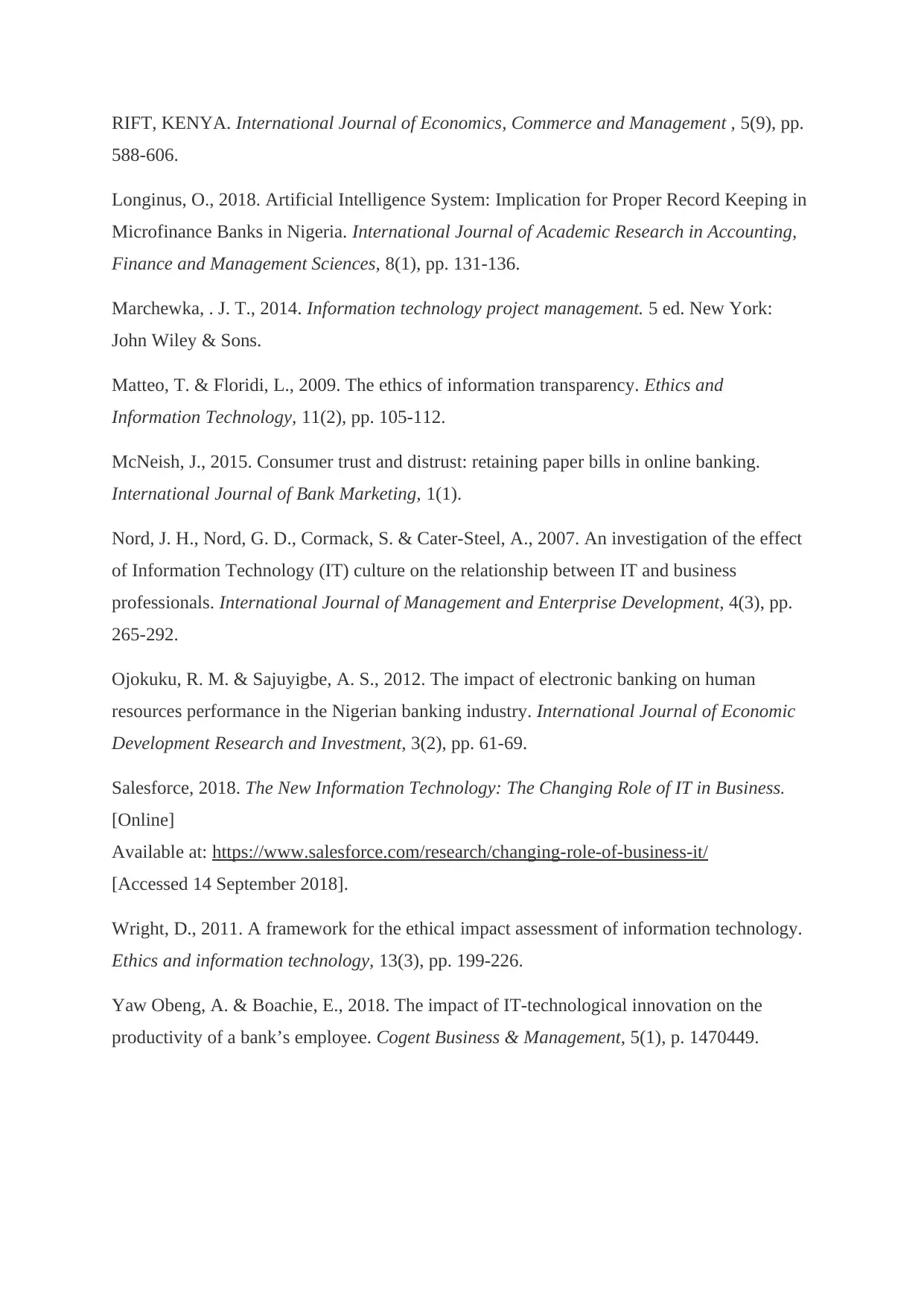
RIFT, KENYA. International Journal of Economics, Commerce and Management , 5(9), pp.
588-606.
Longinus, O., 2018. Artificial Intelligence System: Implication for Proper Record Keeping in
Microfinance Banks in Nigeria. International Journal of Academic Research in Accounting,
Finance and Management Sciences, 8(1), pp. 131-136.
Marchewka, . J. T., 2014. Information technology project management. 5 ed. New York:
John Wiley & Sons.
Matteo, T. & Floridi, L., 2009. The ethics of information transparency. Ethics and
Information Technology, 11(2), pp. 105-112.
McNeish, J., 2015. Consumer trust and distrust: retaining paper bills in online banking.
International Journal of Bank Marketing, 1(1).
Nord, J. H., Nord, G. D., Cormack, S. & Cater-Steel, A., 2007. An investigation of the effect
of Information Technology (IT) culture on the relationship between IT and business
professionals. International Journal of Management and Enterprise Development, 4(3), pp.
265-292.
Ojokuku, R. M. & Sajuyigbe, A. S., 2012. The impact of electronic banking on human
resources performance in the Nigerian banking industry. International Journal of Economic
Development Research and Investment, 3(2), pp. 61-69.
Salesforce, 2018. The New Information Technology: The Changing Role of IT in Business.
[Online]
Available at: https://www.salesforce.com/research/changing-role-of-business-it/
[Accessed 14 September 2018].
Wright, D., 2011. A framework for the ethical impact assessment of information technology.
Ethics and information technology, 13(3), pp. 199-226.
Yaw Obeng, A. & Boachie, E., 2018. The impact of IT-technological innovation on the
productivity of a bank’s employee. Cogent Business & Management, 5(1), p. 1470449.
588-606.
Longinus, O., 2018. Artificial Intelligence System: Implication for Proper Record Keeping in
Microfinance Banks in Nigeria. International Journal of Academic Research in Accounting,
Finance and Management Sciences, 8(1), pp. 131-136.
Marchewka, . J. T., 2014. Information technology project management. 5 ed. New York:
John Wiley & Sons.
Matteo, T. & Floridi, L., 2009. The ethics of information transparency. Ethics and
Information Technology, 11(2), pp. 105-112.
McNeish, J., 2015. Consumer trust and distrust: retaining paper bills in online banking.
International Journal of Bank Marketing, 1(1).
Nord, J. H., Nord, G. D., Cormack, S. & Cater-Steel, A., 2007. An investigation of the effect
of Information Technology (IT) culture on the relationship between IT and business
professionals. International Journal of Management and Enterprise Development, 4(3), pp.
265-292.
Ojokuku, R. M. & Sajuyigbe, A. S., 2012. The impact of electronic banking on human
resources performance in the Nigerian banking industry. International Journal of Economic
Development Research and Investment, 3(2), pp. 61-69.
Salesforce, 2018. The New Information Technology: The Changing Role of IT in Business.
[Online]
Available at: https://www.salesforce.com/research/changing-role-of-business-it/
[Accessed 14 September 2018].
Wright, D., 2011. A framework for the ethical impact assessment of information technology.
Ethics and information technology, 13(3), pp. 199-226.
Yaw Obeng, A. & Boachie, E., 2018. The impact of IT-technological innovation on the
productivity of a bank’s employee. Cogent Business & Management, 5(1), p. 1470449.
⊘ This is a preview!⊘
Do you want full access?
Subscribe today to unlock all pages.

Trusted by 1+ million students worldwide
1 out of 9
Related Documents
Your All-in-One AI-Powered Toolkit for Academic Success.
+13062052269
info@desklib.com
Available 24*7 on WhatsApp / Email
![[object Object]](/_next/static/media/star-bottom.7253800d.svg)
Unlock your academic potential
Copyright © 2020–2026 A2Z Services. All Rights Reserved. Developed and managed by ZUCOL.





